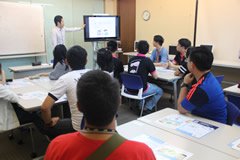2017 Japanese-Language Assistants’ Report: Activities of Japanese Language Assistant in Kuala Lumpur
The Japan Foundation, Kuala Lumpur
YANAIKE Akira
I am currently working as a Japanese-Language Assistant (hereafter referred to as "Assistant") at the Japan Foundation, Kuala Lumpur (hereafter referred to as "JFKL") in Kuala Lumpur, the capital of Malaysia. Kuala Lumpur is home to many ethnic groups, including Malays, Chinese, and Indians, and you can experience a variety of cultures firsthand. Japanese culture is no exception. There are many Japanese companies and stores in Kuala Lumpur, and Japanese can be seen everywhere. As a result, there is a high level of interest in Japan, and many people interested in the Japanese language come to JFKL. My work at JFKL covers a wide range of activities, but two of the core activities are Japanese-language courses and Japanese language and culture introduction events. The following sections introduce these two activities.
JFKL Japanese-Language Courses
JFKL offers Japanese-language courses for persons aged 16 and older. As an Assistant, I am involved in these courses, along with Japanese-Language Senior Specialists, Japanese-Language Specialists, and local instructors. The courses use "Marugoto: Japanese Language and Culture," the official course book of the Japan Foundation, which complies to the JF Standard for Japanese-Language Education. The classes I am involved in are "Starter," "Elementary 2," and "Pre-Intermediate," with classes starting at 6:30 pm and ending at 8:30 pm. Therefore, most of the students come to class after work. Because of this, many students show their fatigue from work before class starts. However, once the class starts not a single student shows any such signs, and everyone is enthusiastic about the classroom activities. And when the class is over, everyone smiles and says, "See you next week, teacher!" as they leave the classroom. Sometimes I have a hard time preparing for each class because it is a lot of work, but when I hear something like that from a student, I truly feel that I am very lucky to have become a Japanese-language teacher.
Japanese Language and Culture Introduction Events
One of my main duties as an Assistant is to help with events that introduce Japanese language and culture. For example, JFKL accepts requests for visits from external educational institutions, such as universities and high schools, in order to provide students in Malaysia with opportunities to learn about Japanese culture. This activity is called "JFKL Visit" in JFKL. JFKL Visit consists of two workshops for experiencing Japanese culture: a mini Japanese-language course and a tour of the JFKL library. I am in charge of the 30-minute mini Japanese-language course each time. Many of the students who visit us have never studied Japanese before, so in order to make the Japanese language as interesting as possible for them, we always play games and quizzes using Japanese. It is not easy to get people interested in Japanese in the limited time of 30 minutes, but I am very happy when students who participated in the JFKL Visit say "Thank you" in their newly learned Japanese.

JFKL Visit mini Japanese-language course
Cooperation with events to introduce Japanese language and culture is not limited to the JFKL Visit mentioned above. At the Japan Festival held by the Universiti Malaysia Sarawak's student dormitory, which I attended alone for the first time last year, I introduced JF Japanese e-Learning Minato and other online Japanese-language learning materials developed by the Japan Foundation, and gave a one-hour Japanese-language course. I may also cooperate with the JFKL Cultural Affairs Department (hereafter referred to as CAD) in their events. In early May of this year, there was an opening reception for the Japanese doll exhibition at a museum in Petaling Jaya, in the state of Selangor, and I was in charge of a mini Japanese-language course and supported the CAD staff in their workshop on experiencing Japanese culture. As you can see, each event to introduce Japanese language and culture is different in both location and content, so it is not easy to prepare for or actually carry out. However, I feel that being in a different environment and interacting with different people will broaden my perspective on the Japanese-language business and help me grow as a Japanese-language teacher.
About the Future
It's been almost a year and two months since I was dispatched to Kuala Lumpur. I have only ten months left of my term. Over the past 14 months, I have been able to gain experience as a Japanese-language teacher by teaching Japanese-language classes of various levels. The Japanese-Language Senior Specialists, Japanese-Language Specialists, and local instructors gave me invaluable advice in preparing and reflecting on my lessons. In addition, the JFKL staff taught me in detail about the Japanese-language program overall. The reason why I, with little experience, have not given up since I was assigned is because of the generous support I have received from everyone at JFKL. I am very happy to be working as an Assistant at JFKL. For the remaining 10 months, I would like to contribute to Japanese-language education in Malaysia with the JFKL staff.
- What We Do Top
- Arts and Cultural Exchange [Culture]
- Japanese-Language Education Overseas [Language]
- Japanese-Language Education Overseas [Language] Top
- Learn Japanese-language
- Teach Japanese-language
- Take Japanese-Language Test
- Know about Japanese-language education abroad
- The Japanese-Language Institute, Urawa
- The Japanese-Language Institute, Kansai
- Japanese-Language Programs for Foreign Specified Skilled Worker Candidates
- Japanese Language Education for Japanese Children Resident Overseas and for the Descendants of Migrants
- Archives
- Japanese Studies and Global Partnerships [Dialogue]
- JF digital collection
- Other Programs / Programs to Commemorate Exchange Year
- Awards and Prizes
- Publications
